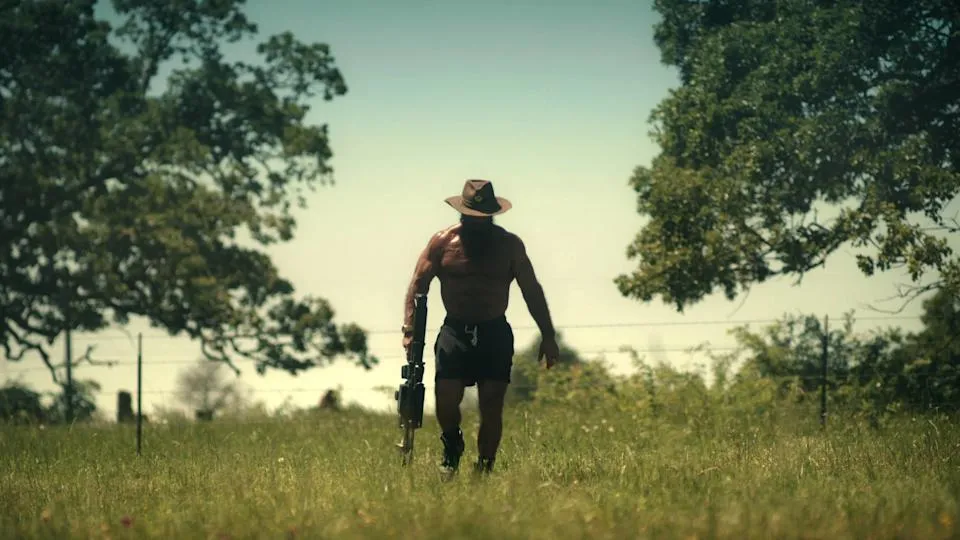In the ever-evolving landscape of social media influencers, few have garnered as much attention – both good and bad – as Brian Johnson, more popularly known as The Liver King. His rise to fame was fueled by a primal diet that revolved around organ meats and raw animal products, accompanied by a robust fitness regimen. Netflix’s documentary, Untold: The Liver King, attempts to chronicle his journey, detailing not only his meteoric rise to fame but also the subsequent controversy that led to his undoing. As a journalist, delving into the ins and outs of this documentary was both fascinating and nauseating, provoking questions about societal obsession with health and wellness influencers.
Johnson’s persona is marked by his commitment to ancestral diets, touting the benefits of raw liver and other offal – the very core of his ‘eat like a caveman’ philosophy. His approach drew flocks of followers who desperately sought shortcuts to health and fitness success in a world filled with conflicting dietary advice. Netflix’s Untold: The Liver King shows us how a simple social media post could resonate with millions, but it also unveils the darker undercurrents of this newfound popularity.
An Overview of the Documentary
Directed by the renowned Brian Knappenberger, the documentary combines raw interviews, stock footage, and social media snippets to narrate the shocking story of Brian Johnson. Viewers are taken on a rollercoaster ride that begins with the influencer’s chiseled physique and muscle-bound selfies, ultimately exposing the dark truths beneath his regal and robust exterior.
For those unfamiliar with the events leading up to the documentary’s release, The Liver King was embroiled in a scandal after emails leaked revealing he had been using anabolic steroids – a revelation that challenged the authenticity of his ‘natural’ health regimen. His brand, built on trust and authenticity, crumbled under the weight of these allegations, stirring outrage among both fans and critics.
Queasy Yet Compelling: Content That Turns Stomachs
One of the striking elements of this documentary is its graphic approach to showcasing Johnson’s unorthodox diet, which will likely leave many viewers feeling queasy. The sight of raw liver, fresh blood, and other organ meats serves as a stark reminder of the extremes influence can drive people to when lured by the idea of ultimate health. The documentary doesn’t shy away from disturbing visuals, making it perhaps one of the most stomach-churning installments in the Untold series.
While I can appreciate the intention behind showcasing the extremes of The Liver King’s lifestyle, a part of me questioned whether such graphic depictions were necessary. Instead of merely informing, this visceral approach risks alienating viewers who may have genuinely wanted to understand the implications of his influencer status without feeling repulsed by the film’s presentation.
The Weight of Responsibility
What I found equally troubling was the lack of accountability shown in the documentary towards Johnson’s choices and the monumental effects these choices have had on individuals seeking to replicate his lifestyle. Influencers carry a significant weight of responsibility when they promote certain health practices, especially when these practices are unorthodox or unsanitary, as shown in this documentary.
This lack of accountability became apparent throughout the film. Although Johnson does express remorse, the overall portrayal exudes an aura of victimhood, shading light on the pressures of maintaining a brand rather than the harm caused to individuals who may have blindly followed his advice. Additionally, by positioning him as a misunderstood figure rather than a purveyor of potentially harmful practices, the documentary let him off easier than he perhaps deserved.
Health Influencers: The Good, The Bad, and The Despicable
The Liver King saga serves as a cautionary tale regarding health influencers and the potential fallout from following individuals who skew the truth. Health recommendations must stem from research, evidence, and expertise rather than merely a desire to amass followers. The documentary puts a stark spotlight on the blurry ethics within this niche, highlighting how the grandeur of a social media presence can distort the reality of healthy living.
In contrast to Johnson’s radical approach, many health influencers are committed to sharing realistic, scientifically-backed wellness strategies. It prompts the question: how do we discern the credible from the charlatans? The Liver King’s tactics are an extreme example, but they mirror the inherent danger of a culture that glorifies sensationalism over science.
Cultural Commentary and Societal Obsession
It is critical to consider the broader implications surrounding figures like The Liver King. What does it say about our culture when individuals prioritize a specific influencer’s approval over medical expertise? The documentary provides food for thought on our obsession with aesthetics and authenticity at the expense of sound advice.
Furthermore, it sparks discourse around toxic masculinity. Johnson embodies a hyper-masculine ideal, often preaching strength and self-sufficiency, which may resonate with a segment of society desiring that imagery. However, on the flip side, this persona can foster unhealthy psychological patterns, including eating disorders and body dysmorphia among susceptible followers.
A Mixed Reception
The reception of Untold: The Liver King has been mixed. Critics argue that it glamorizes harmful behavior rather than condemning it outright. Many feel it overlooks the potential risks associated with following The Liver King’s unflagging idealism. Instead of dissecting the impact of such extreme diets, the narrative leans towards a dramatic retelling of Brian Johnson’s life story.
Fans appreciated the rawness of Johnson’s character, rooted in charisma and confidence, despite the documentary’s unsettling moments. This bifurcation of opinion encapsulates the polarized reception to such figures, exposing how personal branding and a flashy lifestyle can overshadow the core message of healthy living.
Conclusion: Lessons Learned from The Liver King
Ultimately, Netflix’s Untold: The Liver King is an eye-opener about the intersections of health, wellness, and the social media phenomenon. There is much to unpack in terms of representation, consequences, and cultural discourse surrounding influencers.
As consumers of health content, viewers must remember that authenticity extends beyond aesthetics. It’s vital to engage with life choices based on sound science and seek guidance from qualified professionals instead of relying on the latest charismatic influencer. Brian Johnson’s story is not just about a man and his bizarre diet; it reflects our culture’s obsession with simplistic solutions to complex health issues.
In navigating through this documentary, while I felt queasy at times, I was left reflecting on a much larger narrative about the authenticity, ethics, and dangers within the influencer realm. If anything, Untold: The Liver King serves as a pertinent reminder – not just of The Liver King’s journey but of the critical importance of critical thinking in the age of information overload.







